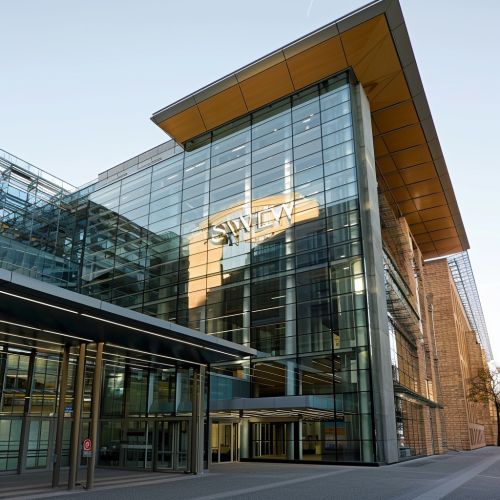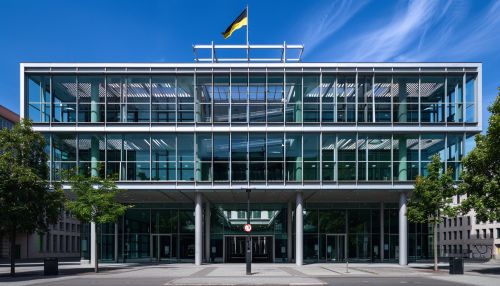Social Democratic Party of Germany
History
The Social Democratic Party of Germany (SPD) is one of the oldest and most influential political parties in Germany. It was founded on May 23, 1863, by Ferdinand Lassalle as the General German Workers' Association (Allgemeiner Deutscher Arbeiterverein, ADAV). The SPD has its roots in the labor movement and has played a significant role in shaping modern German politics.
Early Years and Formation
The SPD's origins can be traced back to the mid-19th century when industrialization was transforming German society. The working class faced harsh conditions, and there was a growing demand for political representation and social reforms. The ADAV, founded by Lassalle, was one of the first organizations to advocate for workers' rights and universal suffrage.
In 1875, the ADAV merged with the Social Democratic Workers' Party (Sozialdemokratische Arbeiterpartei, SDAP), founded by August Bebel and Wilhelm Liebknecht, to form the Socialist Workers' Party of Germany (Sozialistische Arbeiterpartei Deutschlands, SAPD). The SAPD later changed its name to the Social Democratic Party of Germany (SPD) in 1890.
Bismarck's Anti-Socialist Laws
The SPD faced significant challenges during its early years, particularly from Chancellor Otto von Bismarck's Anti-Socialist Laws (1878-1890). These laws aimed to suppress socialist activities and organizations, but the SPD continued to grow in strength and support, operating underground and through legal loopholes. The party's resilience during this period helped solidify its position as a major political force.
Weimar Republic and Nazi Era
The SPD played a crucial role in the establishment of the Weimar Republic following World War I. It was the largest party in the Reichstag and led several coalition governments. However, the party faced internal divisions and external threats from both the far left and the far right. The rise of the Nazi Party and the subsequent establishment of the Third Reich led to the SPD being banned and its members persecuted.
Post-World War II and Reunification
After World War II, the SPD was re-established in both West and East Germany. In West Germany, the party became a key player in the political landscape, participating in several coalition governments and contributing to the country's economic recovery and social reforms. In East Germany, the SPD was forced to merge with the Communist Party to form the Socialist Unity Party (SED), which dominated the German Democratic Republic (GDR) until reunification in 1990.
Ideology and Policies
The SPD is a center-left political party that advocates for social democracy, a political ideology that seeks to balance individual liberties with social justice. The party's core principles include:
- **Social Justice**: The SPD aims to reduce social inequalities and ensure equal opportunities for all citizens. This includes advocating for progressive taxation, social welfare programs, and labor rights.
- **Democracy**: The SPD is committed to democratic governance and the protection of civil liberties. The party supports a strong and transparent democratic system with active citizen participation.
- **Economic Policy**: The SPD promotes a mixed economy that combines free-market principles with government intervention to address market failures and ensure social welfare. The party supports policies that promote sustainable economic growth, job creation, and fair wages.
- **Environmental Sustainability**: The SPD recognizes the importance of environmental protection and advocates for policies that promote sustainable development, renewable energy, and climate change mitigation.
- **European Integration**: The SPD is a strong supporter of the European Union and advocates for deeper European integration, including economic cooperation, social policies, and common foreign and security policies.
Organizational Structure
The SPD has a complex organizational structure that includes various levels of leadership and decision-making bodies. The main components of the party's structure are:
- **Party Congress**: The highest decision-making body of the SPD, which meets regularly to set the party's policies and elect its leadership.
- **Executive Committee**: The main executive body responsible for implementing the decisions of the Party Congress and managing the day-to-day affairs of the party.
- **Regional and Local Organizations**: The SPD is organized into regional and local branches that operate at the state and municipal levels. These branches play a crucial role in grassroots mobilization and local governance.
- **Affiliated Organizations**: The SPD has several affiliated organizations, including the Young Socialists (Jusos), the Social Democratic Women (ASF), and the Social Democratic Trade Unionists (AfA). These organizations represent specific interest groups within the party and contribute to policy development and advocacy.
Electoral Performance and Government Participation
The SPD has a long history of electoral success and government participation in Germany. The party has been a key player in several coalition governments at both the federal and state levels.
Federal Elections
The SPD has participated in numerous federal elections since the establishment of the Federal Republic of Germany in 1949. The party has won several elections and has provided several Chancellors, including Willy Brandt, Helmut Schmidt, and Gerhard Schröder. The SPD has also been a junior partner in coalition governments with other parties, including the Christian Democratic Union (CDU) and the Free Democratic Party (FDP).
State Elections
The SPD has a strong presence in state politics and has governed several German states, either alone or in coalition with other parties. The party's performance in state elections often reflects its national standing and influences its overall political strategy.
Notable Figures
The SPD has produced several notable political figures who have made significant contributions to German and international politics. Some of the most prominent figures include:
- **Willy Brandt**: Chancellor of West Germany from 1969 to 1974, Brandt is known for his Ostpolitik policy, which aimed to improve relations with East Germany and the Eastern Bloc. He was awarded the Nobel Peace Prize in 1971.
- **Helmut Schmidt**: Chancellor of West Germany from 1974 to 1982, Schmidt is remembered for his pragmatic approach to economic and foreign policy, as well as his leadership during the economic crises of the 1970s.
- **Gerhard Schröder**: Chancellor of Germany from 1998 to 2005, Schröder implemented significant economic and social reforms, known as the Agenda 2010, which aimed to modernize the German economy and reduce unemployment.
Challenges and Criticisms
The SPD has faced several challenges and criticisms throughout its history. Some of the most significant issues include:
- **Internal Divisions**: The SPD has experienced internal divisions and factionalism, particularly between its more moderate and more left-wing members. These divisions have sometimes hindered the party's ability to present a unified front and implement its policies effectively.
- **Electoral Decline**: In recent years, the SPD has faced declining electoral support, particularly among younger voters and in former strongholds in the industrial regions of Germany. This decline has led to questions about the party's relevance and ability to adapt to changing political and social dynamics.
- **Policy Criticisms**: The SPD's policies, particularly its economic and social reforms, have faced criticism from both the left and the right. Some critics argue that the party has moved too far to the center and abandoned its traditional working-class base, while others contend that its policies are too interventionist and hinder economic growth.
Future Prospects
The SPD continues to play a significant role in German politics and faces both opportunities and challenges in the coming years. The party's ability to adapt to changing political dynamics, address internal divisions, and reconnect with its traditional base will be crucial to its future success.
Strategic Priorities
The SPD has identified several strategic priorities to guide its future direction:
- **Renewing the Party**: The SPD aims to renew its organizational structure and leadership to better reflect the diversity of German society and engage with new generations of voters.
- **Policy Innovation**: The party is committed to developing innovative policies that address contemporary challenges, such as digitalization, climate change, and social inequality.
- **Strengthening Alliances**: The SPD seeks to strengthen its alliances with other progressive parties and movements, both within Germany and internationally, to build broad coalitions for social and political change.
See Also
- Christian Democratic Union
- Free Democratic Party
- Alliance 90/The Greens
- Weimar Republic
- German reunification


